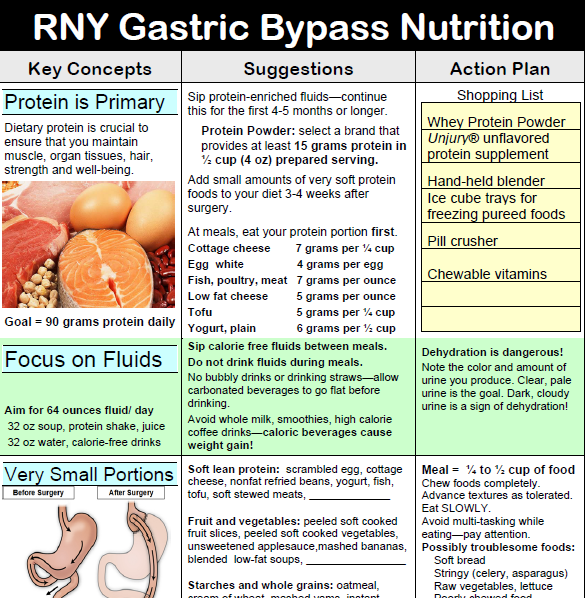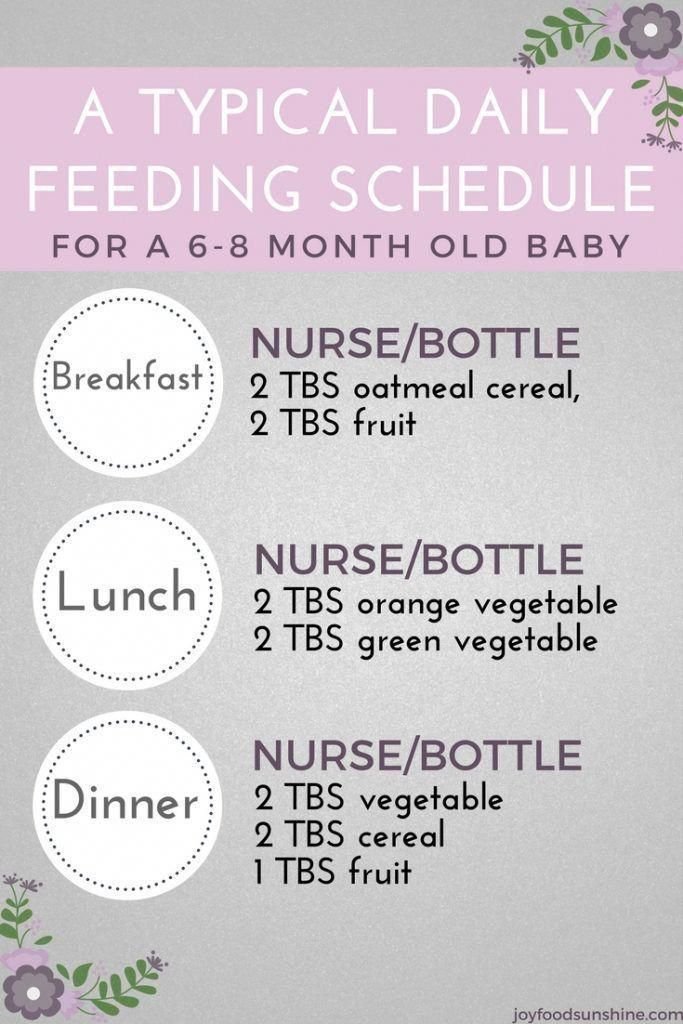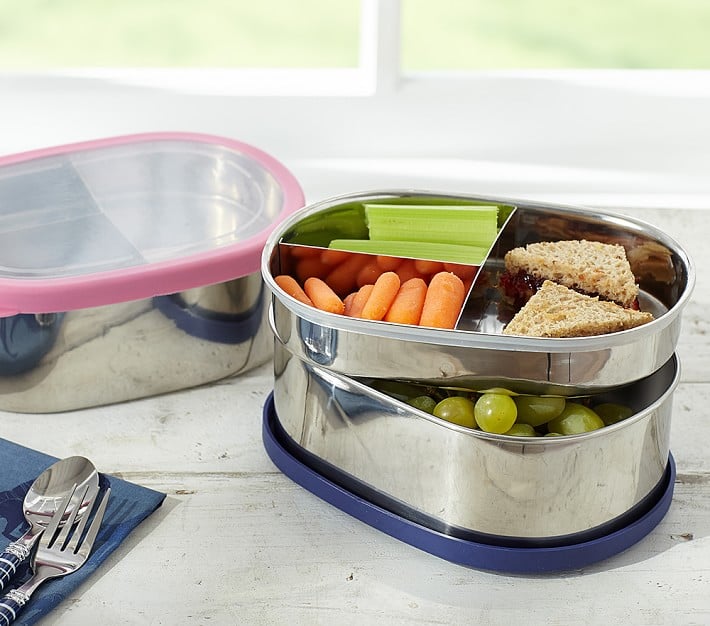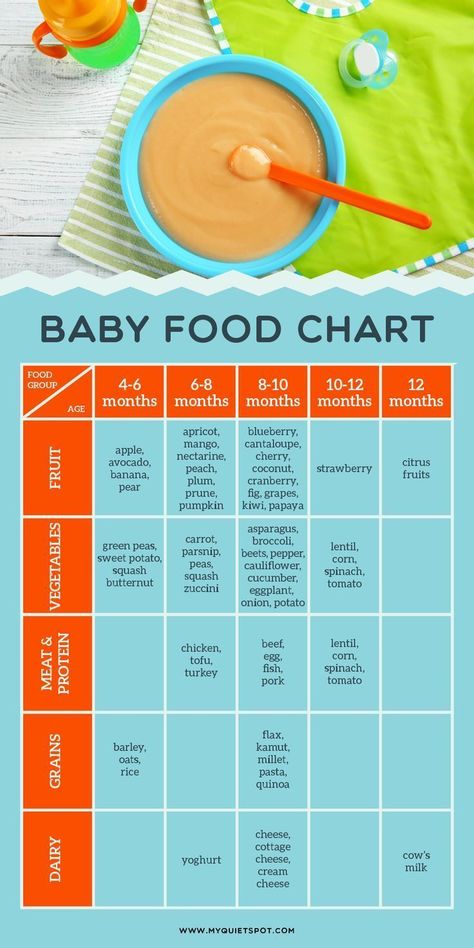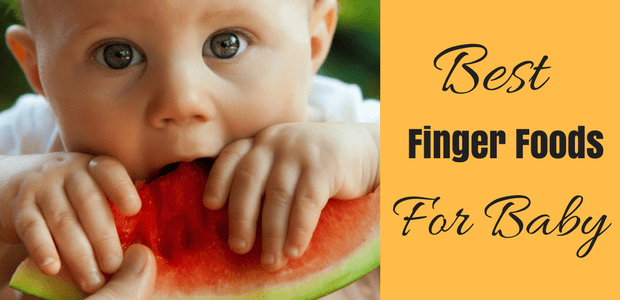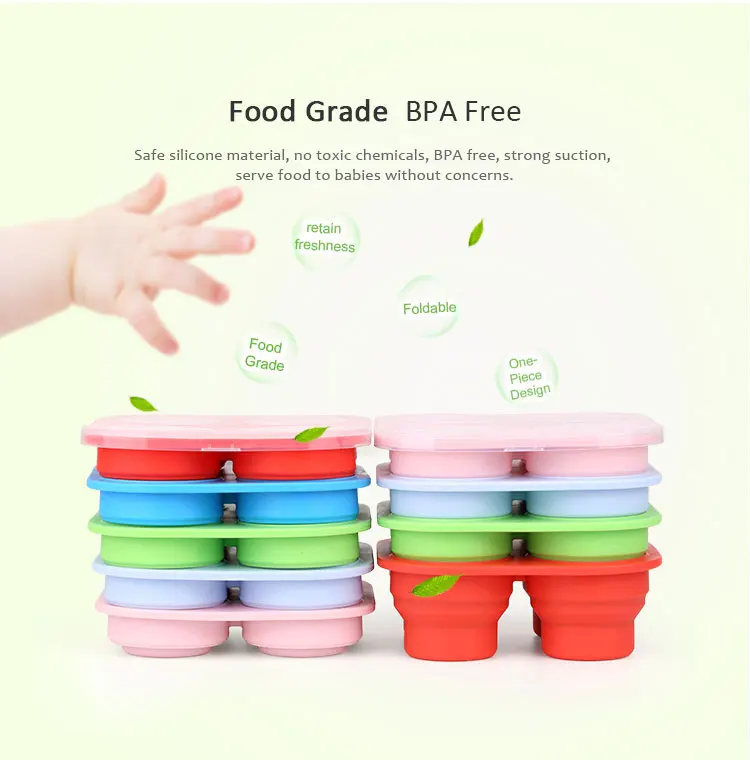Baby food after bariatric surgery
Puréed Food Diet for Post-Bariatric Surgery Patients
COVID-19 Information
Read the Latest
Once you receive your surgeon's okay to progress to foods with a thicker consistency after your bariatric surgery, you can begin puréeing your foods.
Key Goals of the Puréed Food Diet (Phase 2B) After Bariatric Surgery
- Incorporate high protein foods into your diet, which helps your pouch heal.
- Women: 50–60 grams of protein
- Men: 60–70 grams of protein
- Start taking your chewable vitamin supplement with minerals.
- Drink plenty of fluids, 48–64 ounces per day.
Meal Plan for Phase 2B: Puréed Diet After Bariatric Surgery
- Consume three small meals each day.
- Protein supplements
- Gastric Bypass Patients: Begin using protein supplements after each meal to meet your daily protein requirements.
- Laparoscopic Adjustable Gastric Band Patients: Continue using protein supplements as you did in Phase 2A.
- Liquids between meals
- Wait at least 30 minutes after each meal. Then consume an 8 ounce protein supplement or shake, followed by 16 ounces of sugar free, clear liquids.
- Try to spread fluids out over a three-hour period.
- Stop drinking at least 30 minutes before mealtime.
Suggested Foods Ideas for Puréed Diet After Bariatric Surgery
Protein Sources
- Yogurt (plain or sugar free, low or nonfat, blended without fruit chunks)
- Strained cream soups (celery, potato, mushroom, or chicken made with skim milk)
- Skim milk with ½ scoop protein powder
- Protein supplements added to food or water for extra protein
- Mashed cottage cheese (low or nonfat, small curd)
- Ricotta cheese (low or nonfat)
- Scrambled eggs or egg substitute
- Puréed beef, chicken, or turkey
- Baby food meats
- White fish (cod, haddock, tilapia, orange roughy) mashed with a fork
- Canned chicken breast, mashed and moist
- Canned tuna fish in water, mashed
Grains/starches
- Cream of wheat or cream of rice
- Farina
- Grits
- Baby oatmeal
- Mashed potatoes/sweet potatoes
- Puréed winter squash
Fruits
- Diluted, 100% fruit juices (apple, grape, cranberry)
- Light juices sweetened with non-nutritive sweetener
- Applesauce
- Mashed bananas or mashed canned fruits in own juices
- Puréed peaches, apricots, pears, pineapples, melons
Vegetables
- Tomato juice
- Diet V-8 Splash® or V-8 Juice®
- Puréed spinach, carrots, summer squash or green beans
Avoid puréed broccoli, cauliflower, and other fibrous vegetables at this stage.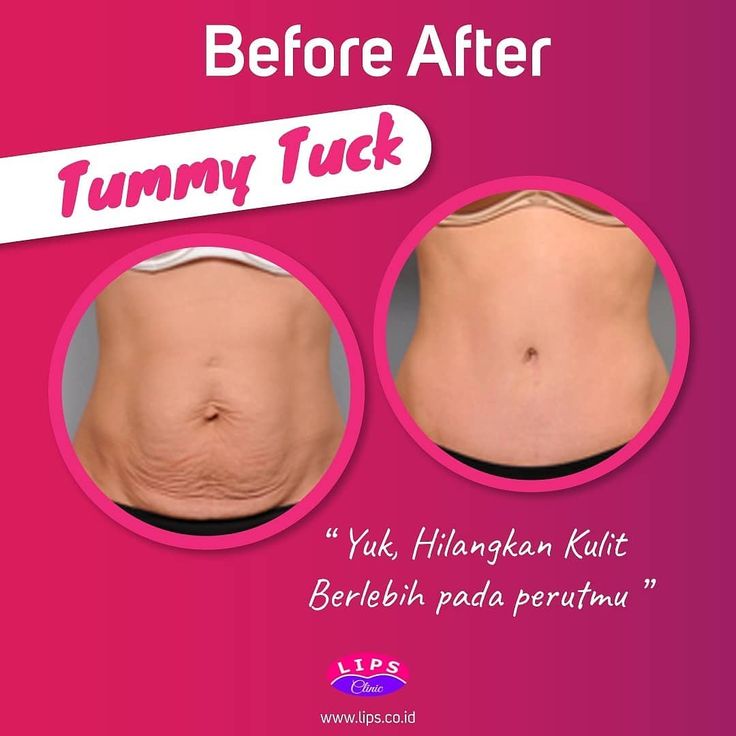
Sample Menu for Phase 2B: Puréed Diet After Bariatric Surgery
Eat the protein portion of your meal first, and don't forget your liquids between meals (about 30 minutes after each meal).
Breakfast
- Protein: 2 tablespoons to ¼ cup scrambled eggs or egg substitute
- Starch: 2 tablespoons to ¼ cup cream of wheat
Lunch
- Protein: 2 tablespoons to ¼ cup mashed low fat cottage cheese
- Fruit: 2 tablespoons to ¼ cup puréed peaches in own juices
Dinner
- Protein: 2 tablespoons to ¼ cup baked skinless chicken breast (puréed) or mashed canned chicken breast
- Vegetable: 2 tablespoons to ¼ cup puréed carrots
Liquid meal- If you're having a liquid meal replacement, soup, or high protein shake:
- Drink 4 ounces (1/2 cup) over 20 to 30 minutes
- Try adding mashed, canned chicken or tuna to soup to increase protein content
- Blend if needed
Suggested Recipes
View Phase 2B: Puréed Food Diet suggested recipes for post-bariatric surgery.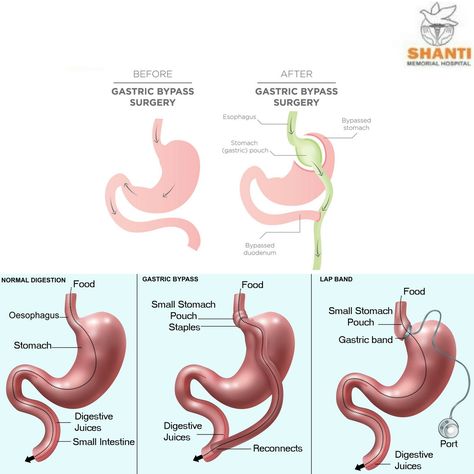
How to Purée Foods
Puréed food should be the consistency of baby food, “spoon thick.”
- Cut food into small pieces and place in blender or food processor
- Add liquid (broth, low calorie gravy or skim milk)
- Puréed until smooth
- Season food to taste
Tips and Ideas for Staying Hydrated
- Sip all fluids slowly to prevent nausea and vomiting
- Carry a water bottle with you everywhere
- Other liquids to help maintain hydration include decaffeinated coffee and tea, broth, and sugar free fruit juices with artificial sweeteners.
Next
As you receive regular checkups after your bariatric surgery, your bariatric surgeon will advise you when to advance to the next phase of your diet.
- Phase 3: Adaptive or Soft Food Diet
- Return to the overview of your diet after bariatric surgery
You Don't Need Baby Food After WLS |
Steph Wagner
January 20, 2016
2023 Pantry Clean Out Challenge!
Runs December 27 - January 10th
Get More Info Here!
Great news, right?!
If you’ve heard that you have to eat baby food after your Gastric Sleeve, Bypass, Band or Duodenal Switch surgery…I have great news for you.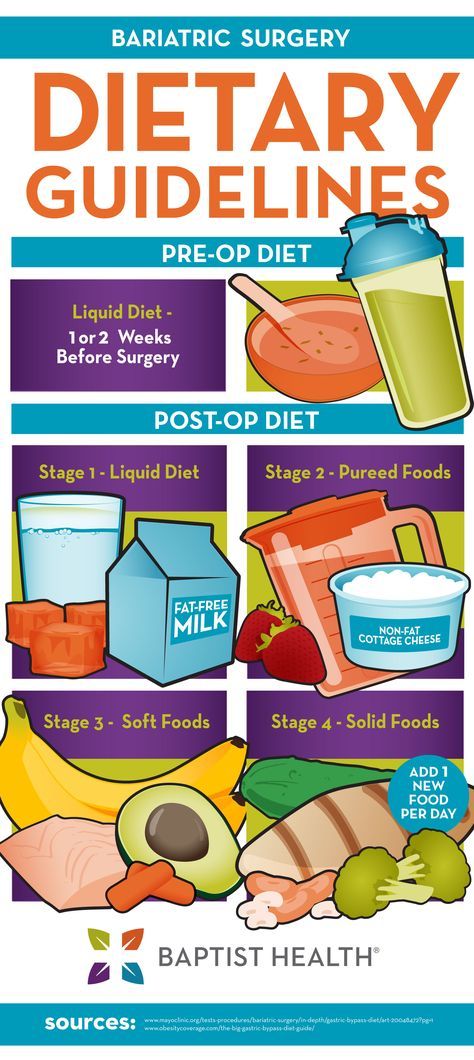
You may see a list of diet stages for after your surgery – Liquid, Pureed, Soft and Regular. Some programs will list baby food on their pureed diet.
Every Bariatric Program is different in their diet progression. (Be sure to follow your own doctors recommendations, even if they differ from what I share on this site.) Your program may have a very similar structure to these four phases. Or it may only have three phases. Or it may have five or six phases. There are several different philosophies on the post-op diet, including how to progress yourself back to foods afterwards!
The Pureed Diet is sometimes included, and sometimes not included. I’ve worked for Bariatric Programs that used the Pureed Diet and some that haven’t. So what’s the deal?
Regardless of differences in the diets, the ultimate goal is all the same. To keep stress off your healing stomach. If you advance your diet too quickly, there is risk of irritating your stomach or even causing a stricture or blockage in your new stomach. You certainly don’t want to eat chicken breast right out of the gate for this reason!
You certainly don’t want to eat chicken breast right out of the gate for this reason!
If you do have a program that uses the Pureed Diet stage and it lists “baby food” as an option…you can skip it all together. If you just plain can’t stomach the idea of eating out of a jar of green beans, then don’t! I personally wouldn’t recommend it anyway (for lack of protein and for various other reasons) but if your program does include it, do not fret. It’s a guideline, it’s not a requirement.
The same goes for blending your meats (ick!!!) Some programs may list blended meats on the food list which may mean putting chicken thigh meat in a blender with a little bit of broth. Before you ask – nope. I’ve never tried it. No thanks.
Just because you are undergoing a weight-loss surgery and need to cautiously advance your diet, doesn’t mean you have to make it as miserable as possible. While you DO want to stick with only the phase you are supposed to be in, don’t feel like you must endure awful foods.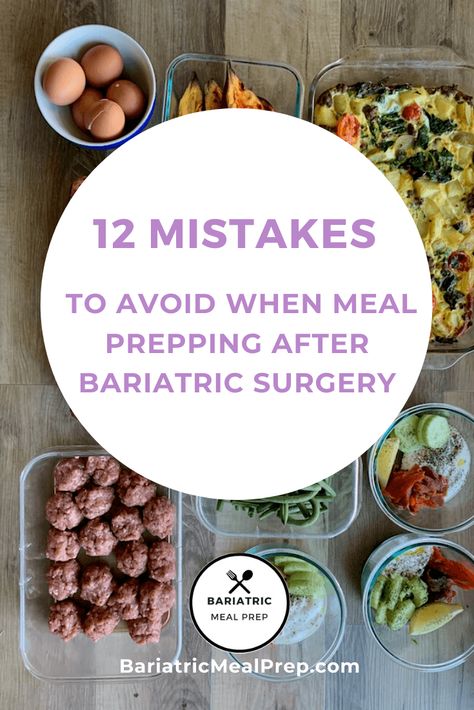 Get creative with your liquids and try soft mushy foods like tuna salad, cottage cheese, Greek yogurt and scrambled eggs. Yes…”real” foods that don’t require a blender or a jar opener! (Check out my blog post “The First Bite, When Your Liquid Diet is Finally Over“)
Get creative with your liquids and try soft mushy foods like tuna salad, cottage cheese, Greek yogurt and scrambled eggs. Yes…”real” foods that don’t require a blender or a jar opener! (Check out my blog post “The First Bite, When Your Liquid Diet is Finally Over“)
For the record, my personal recommendation to my own patients and clients is to follow a liquid diet for two weeks after surgery, then advance to a soft mushy protein phase for two weeks. After those first four weeks have gone successfully, patients are advanced back to a “regular” bariatric diet and can slowly begin incorporating more solid proteins. Again, do not replace your doctors recommendations with my own.
For more bariatric specific blog posts be sure to sign up for my email list! You may also consider becoming a Premier Access Member for meal plans, recipes, educational videos and more!
Click here to Subscribe to the Food Coach Me email list!
Nutrition after bariatric surgery | FSCC FMBA of Russia
Bariatric surgery is the most effective treatment for obesity and related diseases. However, if you do not follow the principles of proper nutrition after bariatric surgery, then all the efforts of the doctor may be in vain.
However, if you do not follow the principles of proper nutrition after bariatric surgery, then all the efforts of the doctor may be in vain.
At the first stage, changing long-term eating habits can be difficult. To gain excellent physical shape, you will need to be persistent and follow all the doctor's instructions. Specialists of the FSCC FMBA are ready to provide professional assistance to each patient at any stage of treatment. nine0003
Principles of a balanced diet after bariatric surgery
It is important to remember that bariatric surgery is surgery on the gastrointestinal tract. It changes the conditions for the functioning of the digestive system, and nutrition after surgery has some features. Your doctor will provide you with a personalized diet plan.
General recommendations to follow:
- Protein is the main component of the diet. You need to consume at least 60 grams of protein per day. It is found in sufficient quantities in meat (turkey breast, chicken, fish fillet, beef, pork), low-fat cheese, cottage cheese, eggs, peanut butter.
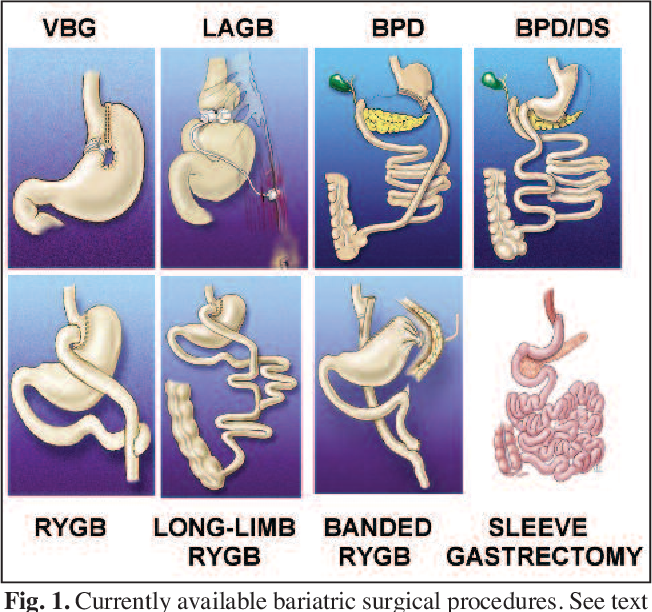 nine0014
nine0014 - Do not skip meals. Frequent, fractional meals will prevent stomach overflow and improve metabolic processes.
- Eat only at the dinner table, do not rush.
- Serve small portions on plates. Cut food into small pieces, chew thoroughly and slowly. Use small dishes, baby spoons to avoid overeating. Stop as soon as you feel full.
- Drink plenty of fluids throughout the day (6-8 cups). Give up carbonated, high-calorie drinks, caffeine. Drink at intervals of 30 minutes before or after meals, this will help prevent nausea, vomiting. nine0014
- Take a daily vitamin/mineral supplement (multivitamin, calcium citrate), but check with your doctor first. Additionally, vitamins B12, D, iron may be required.
Remember that a balanced diet after bariatric surgery is not just a diet, but a new way of life. In order to lose weight, healthy habits must become an integral part of your life.
Diet after bariatric surgery
As with other surgical interventions, the diet after bariatric surgery is severely restricted for several weeks.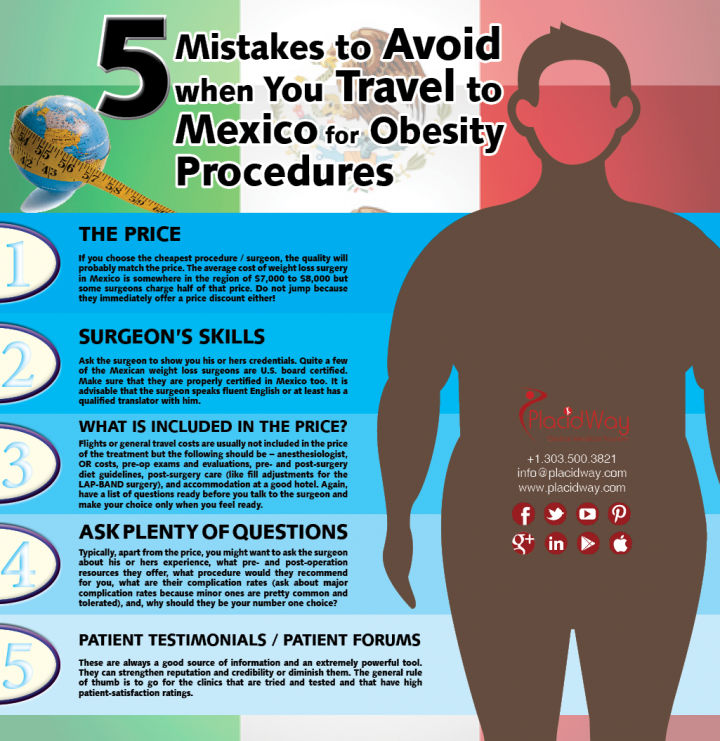 This is necessary to reduce the frequency of possible complications and adapt the gastrointestinal tract to changes. nine0003
This is necessary to reduce the frequency of possible complications and adapt the gastrointestinal tract to changes. nine0003
1-2 the second day after the operation. The first step is "pure liquids". Drink no more than 100 ml of liquid (1/2 cup) at one time - in small sips.
- Water
- Bouillon
- Decaffeinated coffee
All fluids must be at room temperature.
3-21 days after surgery. The second step is "enriched liquids" / protein blends.
Gradual increase in fluid intake up to 150 ml in one go. nine0003
Calorie content of the daily diet is about 1000 kcal, protein intake is not less than 60 g per day.
- Skim dairy products (
- Fat-free unsweetened yoghurt
- Chicken, turkey, beef, fish broths
- Liquid porridge made from rice flour, wheat groats, oat groats
- Heavily crushed seasonal fruits in the form of liquid purees (sugar free)
- Reconstituted Protein Shakes
- Unsweetened teas
- Protein mixtures.
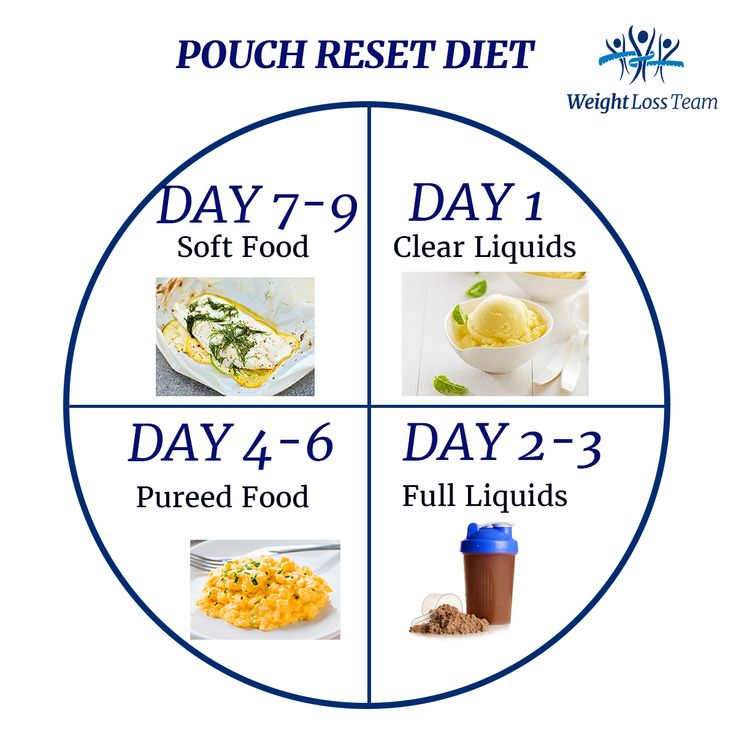
Content per meal:
protein not less than 25 g
carbohydrates not more than 5 g
fat not more than 1 g
3-6 weeks after surgery. The third step is "all food in the form of a homogeneous puree."
The amount of food consumed is increased to 200 ml or 1 cup. The following chopped foods are added to the diet:
- Baby vegetable and fruit purees without sugar
- Baby chicken and turkey meat purees
- Fat-free cottage cheese and curd cheeses, liquid consistency (
- Eggs (1 yolk per day)
- Hummus, tofu
- Mixed vegetables, puréed with white chicken or turkey meat
- Lean fish
7 weeks after surgery and beyond. Fourth step.
The amount of food consumed is not more than one cup (200 ml), a serving of meat food is not more than 60 gr. The following foods are added to the diet: nine0003
- Well cooked pasta and rice
- Practically all foods are allowed except tough beef, sweet and fatty foods
The main rule: Proteins are the main part of nutrition! (not less than 60 g per day)
Vitamins and mineral supplements
After surgery, there is a deficiency not only of protein, but also of some physiologically active substances.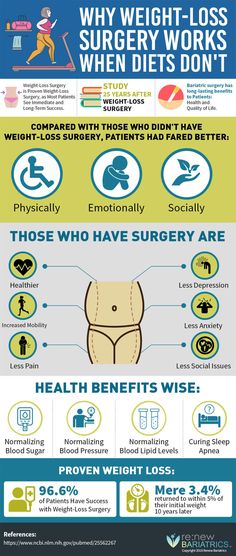 Their reception depends on the methods of the operation and the individual characteristics of the patient. nine0003
Their reception depends on the methods of the operation and the individual characteristics of the patient. nine0003
Essential vitamin supplements include:
- multivitamins and minerals - dosage 1-2 times a day with meals - to provide the body with a sufficient amount of trace elements;
- vitamin B12 - dosage of 1000 mcg per day in the form of tablets or sublingually - to restore blood and nerve cells, improve digestion and protein synthesis;
- iron - a dosage of 45-60 mg per day - for the work of red blood cells that supply oxygen to body tissues; nine0014
- Calcium Citrate with Vitamin D - 500-600 mg 2-3 times daily with meals - to support bone strength and proper heart function.
After malabsorptive and combined interventions, the absorption of important elements is impaired, therefore iron, calcium, B12, folate, zinc preparations can be prescribed.
If a longitudinal resection of the stomach or bandage is performed, the diet is supplemented only with prophylactic complexes of multivitamins and minerals.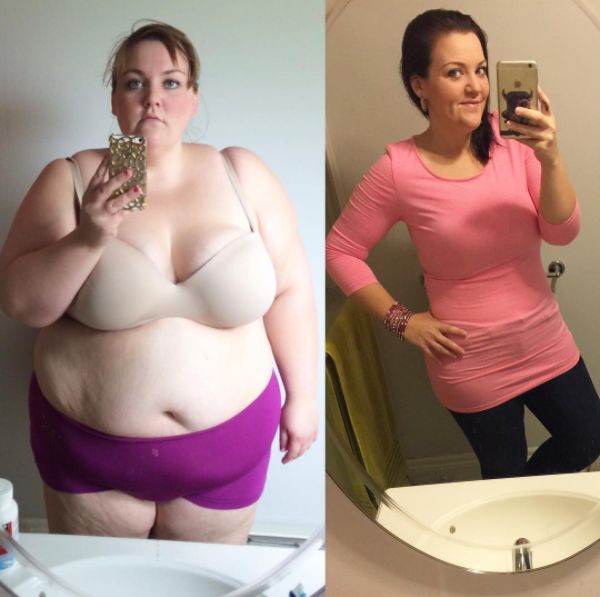 nine0003
nine0003
After the operation, it is necessary to consult a doctor and follow his recommendations. FSCC FMBA has accumulated vast experience in the treatment of obesity. The bariatric surgery department is equipped with the latest equipment, and comprehensive programs have been developed aimed at effective weight loss and fixing the result.
You can make an appointment with a specialist through the form on the website or by phone.
You may be interested in:
- Diet after bariatric surgery
- This must be remembered for life!
- Can I eat sugar after surgery?
- Exercise after bariatric surgery
- obesity treatment
- Obesity 1 degree
- Obesity 2 degrees
- Obesity 3 degrees
Nutrition after stomach surgery. Menu and diet.
After bariatric gastric surgery, you will need to make significant changes to your routine and diet to maximize weight loss. nine0003
Diet after stomach surgery:
-
- High protein, low carbohydrate diet
- Slow transition from clear liquids to solid foods after surgery
- Eating healthy foods, primarily those containing protein
- Exclusion of sugary drinks
- Minimizing snacking throughout the day
- Small portions and thorough chewing
- Vitamin and mineral supplementation
- Trigger food and alcohol avoidance
Read the sections below for more information.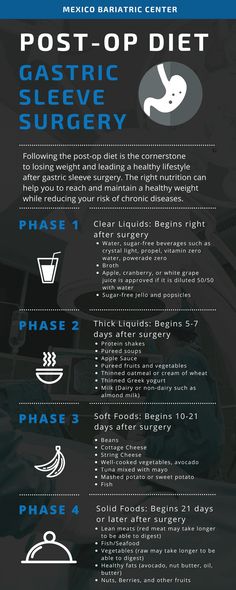
Page content
- 03. 5 Basic dietary principles
- 04. Depending on the type of operation
- 05. As is after the bariatric operation
- 06. Food dependence
- 07. 12 Useful tips
- 08 08 08 08 Vitamins & Supplements
- 09. Products that should be avoided
- 10. Alcohol after the bariatric operation
01. Diet to the bariatric operation
Section resumes:
- Make sure that you use a lot of protein and less carbohydrates 9003
- Avoid "junk" food before surgery
Starting a healthy diet before surgery is important for 3 reasons…
-
- The higher the body mass index before surgery, the greater the likelihood of complications. Eating well before surgery will lower your BMI and reduce your surgical risks.
- A proper diet will give your body the energy and nutrients it needs to recover from surgery and function properly during an intense weight loss.
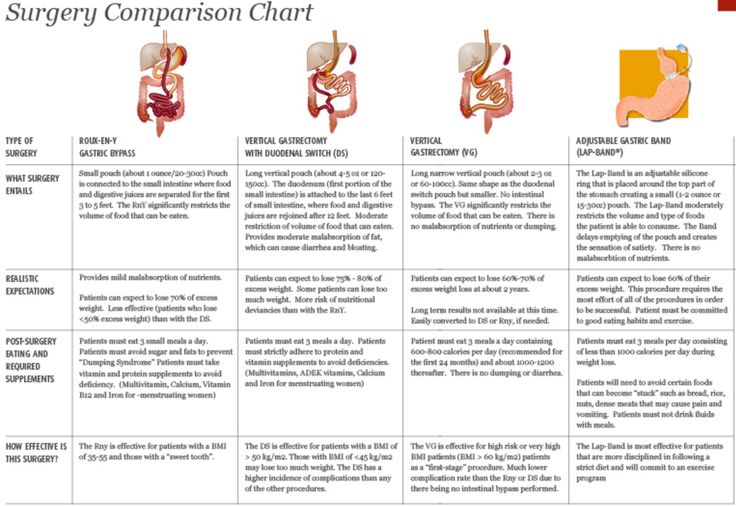
- Helps to avoid late complications of surgery in the future, while increasing the intensity of weight loss.
Wisdom says: "Once you're thinking about bariatric surgery, it's time to change your lifestyle!"
From the moment you begin to seriously prepare for weight loss surgery, your diet will have to change forever.
Consider the period prior to surgery.
- You are training yourself to learn how to be disciplined about nutrition.
- Your surgeon will help you achieve your goals.
- You will also consult with an experienced nutritionist who will understand your eating habits and help you create a new meal plan.
Preoperative diet will be high protein, low carbohydrate and high in fluids (with the exception of sugary liquids ).
During the two weeks prior to surgery, your diet will be 1,000 calories or less.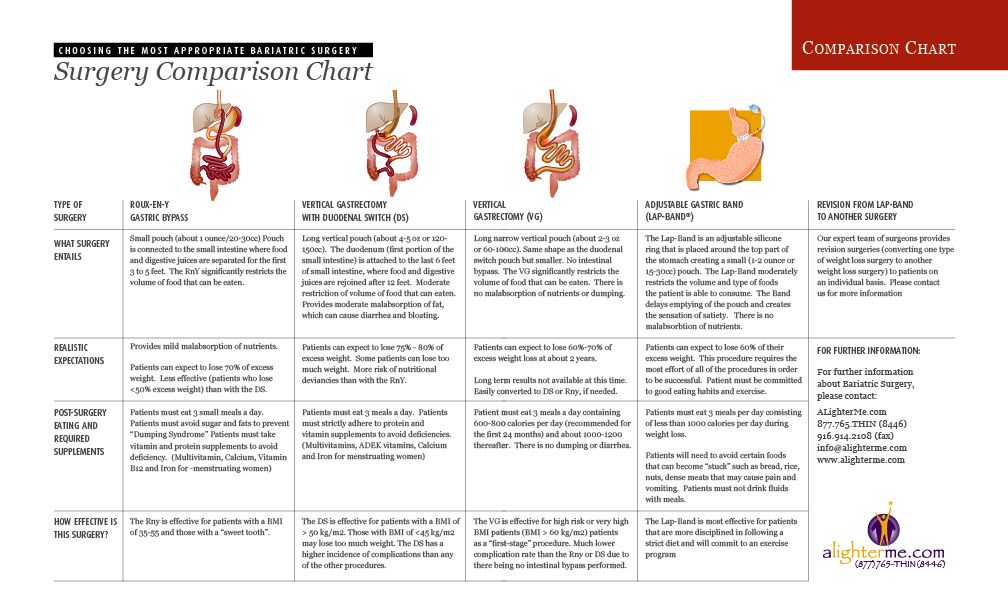 To make sure you're getting enough of all the micronutrients you need, your dietitian may prescribe vitamin/mineral supplements
To make sure you're getting enough of all the micronutrients you need, your dietitian may prescribe vitamin/mineral supplements
Eating a high-protein/low-carbohydrate diet is important for three main reasons...
-
- Reduces the risk of bleeding
- Promotes healing of postoperative wounds
- Has a positive effect on the state and function of the liver - enlarged liver due to the pathological process of NAFLD (more details - see obesity and NAFLD) may cause certain technical difficulties during the operation.
02. diet after stomach surgery
SECTION SUMMARY:
- You will gradually move from clear liquids to solid foods
- Your surgeon and nutritionist will discuss your diet in detail during the first few weeks after bariatric surgery.
- Careful adherence to the recommendations will contribute to faster recovery after surgery and minimize side effects.

Remember: In the first days after the operation, you will drink ONLY CLEAR LIQUIDS
Mix it up!
Starting from the second week, blender will become an integral part of cooking. You will move on to liquid creamy food.
- It is desirable to add protein mixtures (protein shakes) during the first 2 weeks after surgery, while the mixture should be liquid. It is necessary to drink in small sips every 10-15 minutes.
- From 2nd to 6th weeks you can switch to a thicker "puree" food (but still eliminate solid food!). You will experience an early feeling of satiety. You can use yoghurts (not sweet!), baby food (better vegetable), broths. nine0014
- After 4 weeks, you can start eating solid foods in small portions. Chew pieces thoroughly, avoid coarse-fibre meats, raw vegetables, and foods that cause bloating (dairy products, coarse-fibre foods, legumes).
Introduce new foods slowly to find out how your body tolerates this type of food.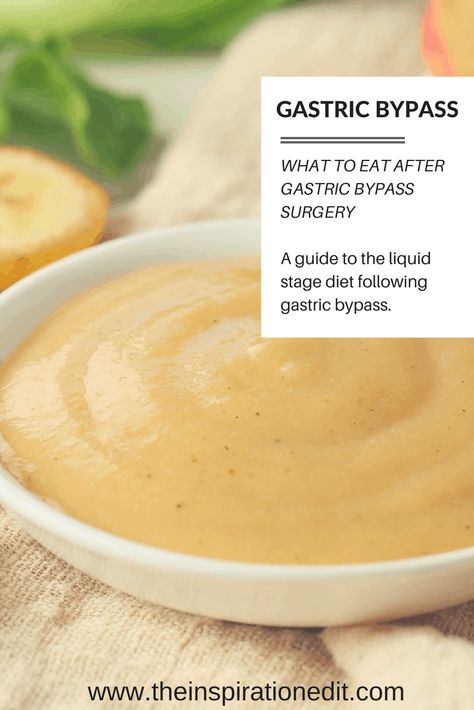
After 6-8 weeks, you will be completely on the new diet. nine0003
IMPORTANT : During the first few months after surgery, you must be very careful about your drinking habits to avoid dehydration.
Remember: Your body needs at least 8 cups of fluid a day.
Insufficient fluid intake can lead to nausea and persistent vomiting, which in turn can lead to further dehydration and vitamin and mineral deficiencies and require hospitalization. nine0003
03. 5 basic dietary principles
SUMMARY:
- Prefer healthy food
- Be sure to eat enough protein
- Monitor blood sugar
- Remember to drink the right amount of water at the right time
- Avoid snacking
So what should you eat?
Long-term bariatric diet includes 5 basic principles …
- Eat healthy food
It is very important to understand what you eat and how you eat .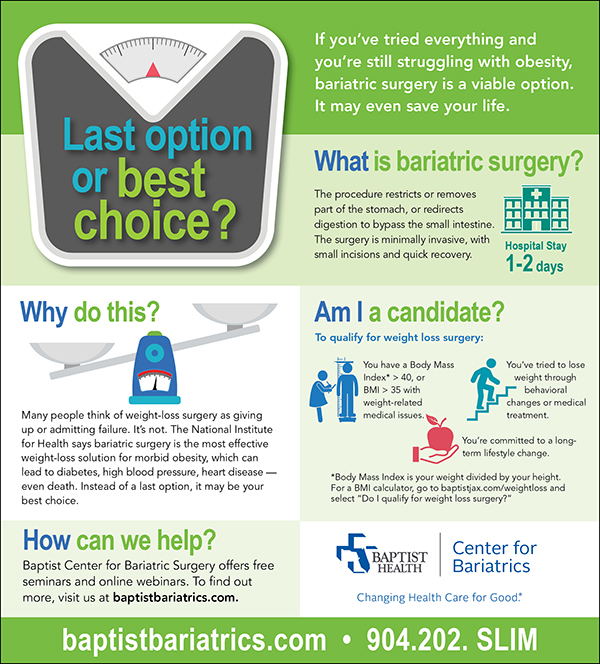
Before going into details, some good news:
1. Eating a healthy diet after surgery will be much easier than before. nine0075 2. Many patients report that they enjoy healthy food and exercise much more than before surgery.
3. Many patients are disgusted by "even the thought of unhealthy food after surgery."
Remember: Your diet should consist of the following FOG foods …
-
- F arm farm-raised food (e.g. chicken, turkey, eggs, dairy products)
- O cean - comes from the ocean (i.e. fish and other seafood)
- G round - grown in the ground (i.e. fruits, vegetables, nuts, whole grains.
Try to avoid anything that has been altered in any way by man.
A good rule of thumb can be applied by reading the label...
"If a product has more than 3-5 ingredients, or if there are any ingredients you can't pronounce, don't buy them.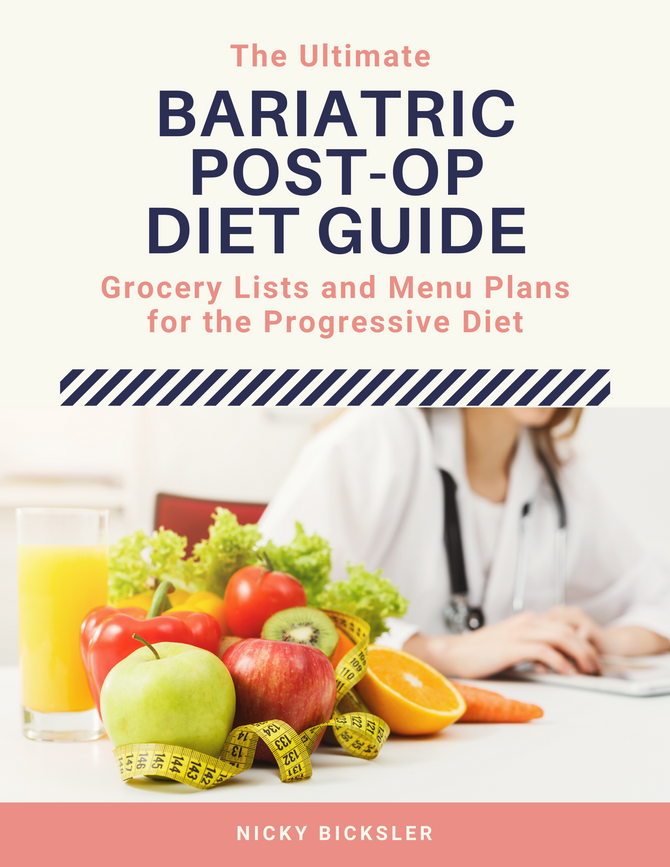 "
"
How you prepare food is just as important as what you cook…
- Avoid frying
- Use skimmed milk instead of whole milk.
- Use chicken or vegetable broth instead of butter.
- Replace butter in recipes with applesauce or yogurt.
- Add spices or lemon juice to add flavor instead of olive oil
We know, we know...how boring and monotonous, right?
Give healthy eating a try. Not only will you get used to this diet, but you will achieve long-term results in terms of weight loss. nine0003
In addition, after surgery, many patients experience discomfort from junk food.
- The main thing is protein.
Protein is one of the most important nutrients for your body. The required amount of protein after surgery is up to 80 grams per day.
Before surgery, with your "large" stomach, this was not a problem.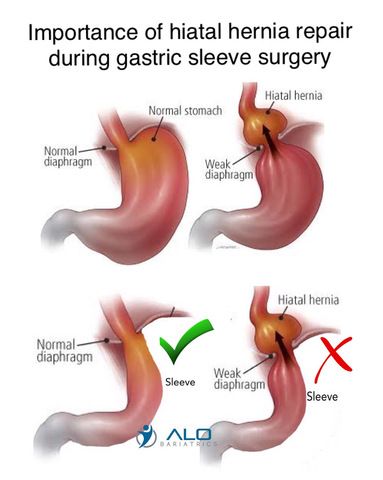 But now that your stomach has been reduced in size, 80 grams is quite a lot. nine0003
But now that your stomach has been reduced in size, 80 grams is quite a lot. nine0003
Remember: Your body will do its best to get enough protein, so if you don't get enough protein in your diet, your body will start getting protein from muscle tissue, breaking it down. Symptoms of muscle tissue catabolism are nausea, irritability, weakness and fatigue.
If the lack of protein intake persists for a long time, swelling, hair loss and skin problems may occur, a weakened immune system occurs and the risk of developing infectious complications increases. nine0003
Therefore, first eat foods rich in protein - meat, fish, soy and dairy products, legumes and nuts.
Be aware that many foods that are high in protein are also high in fat, so try to choose "low fat" foods.
If you find it difficult to get enough protein from "regular" foods, you can add a protein shake to your diet at the end of the day.
- Control your blood sugar
Stable blood sugar helps keep you on track by preventing cravings.
To maintain normal blood glucose levels …
- Avoid simple carbohydrates. Foods rich in simple carbohydrates include white bread, potatoes, white rice, corn, peas, as well as sweets, ice cream, donuts. nine0014
- Eat complex carbohydrates in small portions (along with plenty of protein) - vegetables, apples, and "brown foods" such as whole grain bread and brown rice. These foods are also high in fiber, which contributes to normal intestinal motility.
- Drink enough liquid at the right time
To prevent dehydration after bariatric surgery, it is important to drink enough fluids (low-calorie fluids such as unsweetened herbal tea are preferred). nine0003
Remember: drinking only plain water can lead to the development of electrolyte imbalance (water intoxication syndrome).
Discuss specific recommendations on drinking regimen with the operating surgeon and nutritionist.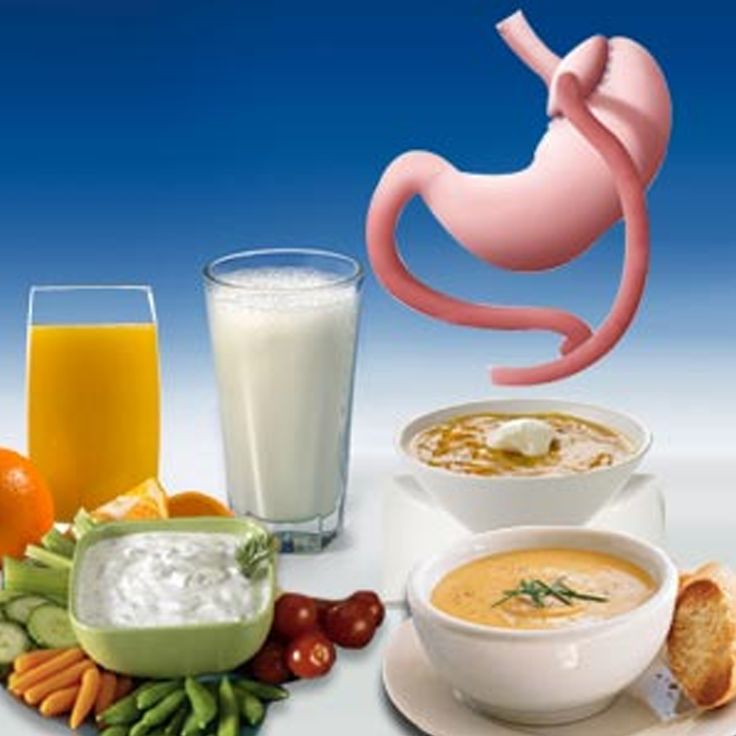 As a rule, plain water should make up no more than 50% of the total fluid consumed per day.
As a rule, plain water should make up no more than 50% of the total fluid consumed per day.
Important: Your body needs at least 8 cups of fluid a day to prevent dehydration. Don't take this lightly, given the size of your "small" stomach, this can be quite tricky. nine0003
Do not drink during meals - at least one hour after eating. The simultaneous use of liquid and food increases the amount of consumed portion and promotes faster passage of food through the gastrointestinal tract, causing a recurrence of hunger and, ultimately, may lead to the restoration of body weight (for more details, see restoration of body weight after surgery)
It is advisable to always keep a bottle of water or tea near you and drink in small sips every 15-20 minutes. nine0075 Important: Measure your fluid intake every day.
- Do not snack
Snacking between meals is the fastest way to hinder your weight loss progress.
Try not to snack!
By far the best way to achieve maximum results is to keep a food diary. Plan your meals ahead of time.
Tip: Take your food diary with you when you go to the grocery store - buy only the products you have planned.
We strongly encourage you to print out the Post Bariatric Surgery Diet Guide .
Recommendations to the patient after LRBZ
Recommendations to the patient after HPRG
Recommendations to the patient after LMZH / PLAS
Recommendations to the patient
04. 04. 04. 04. 04. 04. 04. 04. 04. 04. 04. 04. 0034
SUMMARY:
- Specific dietary recommendations have been developed after each type of bariatric surgery, including LRB, LRV, LMVR, LVR, LBP.
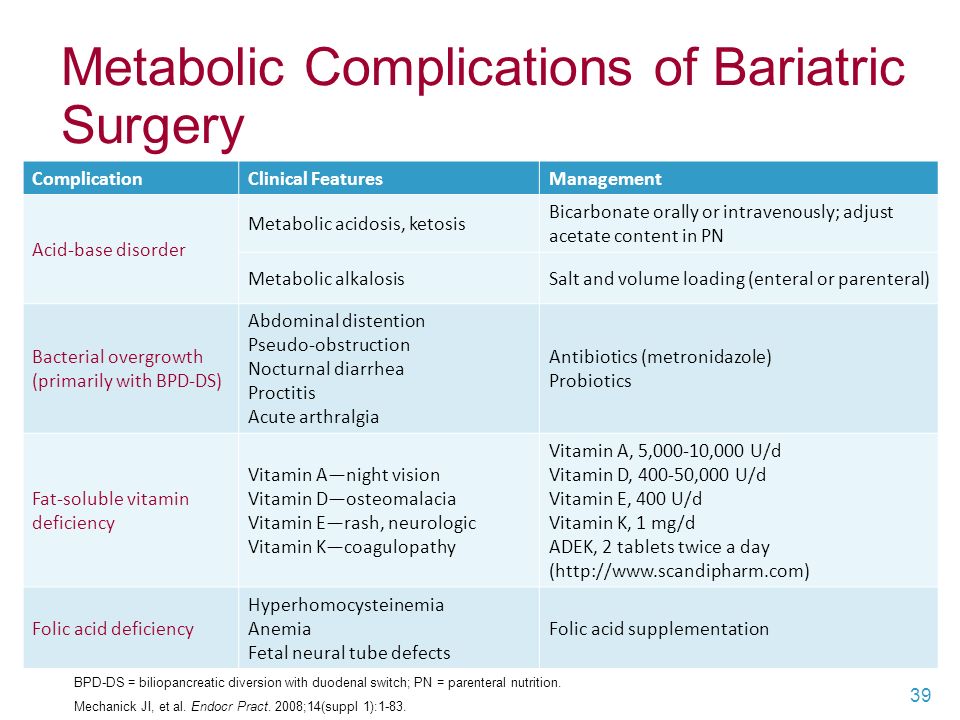
The recommendations described in this section apply to all patients, regardless of the procedure performed. However, there are certain nutritional features after each specific intervention.
Features of nutrition after LPR. nine0034
A change (reduction) in the size of your stomach after surgery will lead to changes in your diet:
-
- You will feel full sooner
- If you eat food too quickly, you may experience difficulty swallowing as a result of food returning from the stomach to the esophagus (after the gastric tube is full). To avoid this situation, chew your food thoroughly, eat slowly, and favor foods that are easy to digest. nine0014
- The stomach tube will stretch somewhat over time.
Diarrhea may occur in patients after LPR if dietary recommendations and diet are not followed. Planning your meals and adhering to dietary recommendations usually allows you to normalize the stool, however, some patients find that diarrhea is caused by lactose intolerance - in this case it will be necessary to refuse dairy products.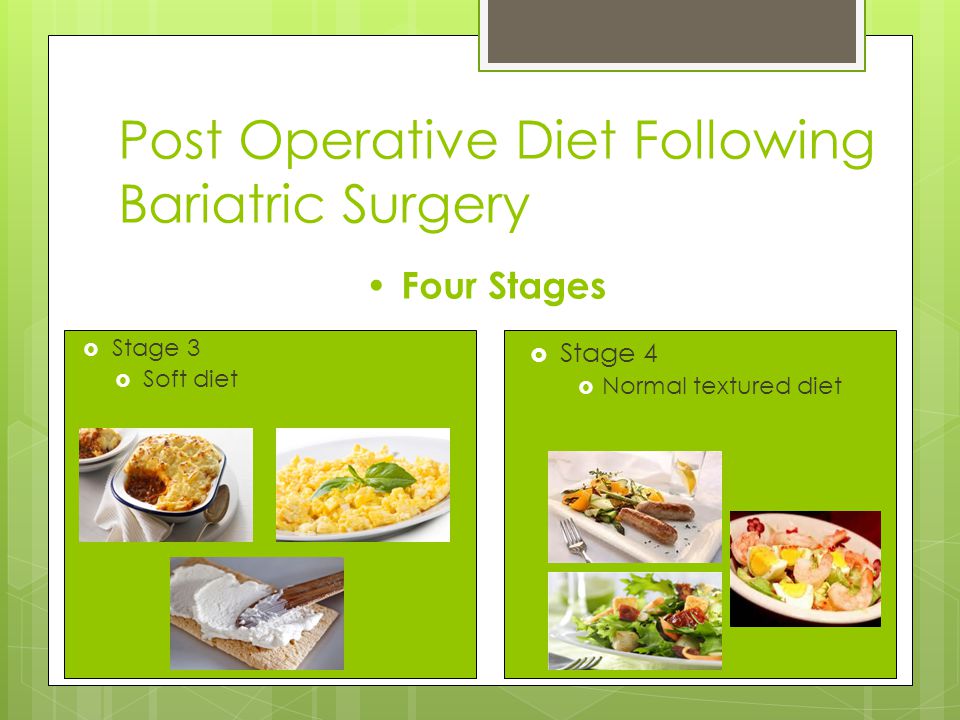
Features of nutrition after LRBJ.
Banding reduces the amount of food needed to make you feel full. Therefore, nutritional recommendations are similar to those after LPR.
Unlike other surgeries, LRBJ does not imply a change in the anatomical structure of the gastrointestinal tract - therefore, you should not drink liquids 30 minutes before a meal and within 30 minutes after a meal, as it (water) due to "dilution" volume will increase the amount of food eaten. nine0003
Peculiarities of nutrition after LMS / LLS.
Just like after LRV surgery, due to the small size of the stomach, you will feel full sooner. It should be noted that your taste preferences may also change.
If dietary recommendations and a proper diet are not followed, many patients after LVH, and especially after LVH, are worried about manifestations of dumping syndrome . (you can learn more about this condition in the complications tab of bariatric surgeries)
In contrast to LVVR, constipation is more common after LVH and LVH.
In order to avoid problems with the stool, it is necessary to drink more liquid.
Due to the malabsorptive component of LVH and LVH surgery, it will be necessary to take special vitamin/mineral supplements for the rest of your life after surgery to avoid dangerous vitamin/mineral deficiencies.
Alcohol use after LVH
The physiological effects of alcohol after the operations of LVH and LVH are intensified.
This fact is supported by a study showing that patients after LVH and LVH have higher blood alcohol levels than controls when drinking the same amount of alcohol.
Studies also show that patients who have undergone LVH and LVH have an increased risk of developing alcoholism. Some experts believe this is due to changes in your brain's "pleasure center". nine0075 Faster absorption and more pronounced effect of alcohol consumption after these operations may influence the "reward" processes in the brain, increasing the likelihood of developing alcohol-related problems.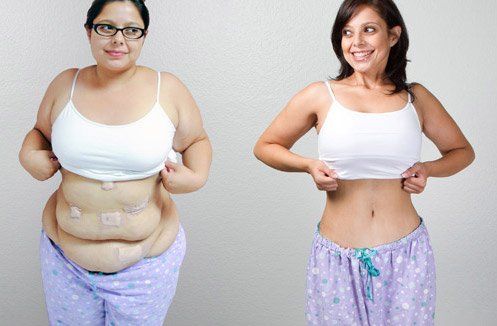
Important: Patients with a history of alcohol consumption have a higher risk of alcohol-related problems after both LVH and LMWH.
Advice: Patients who have previously abused alcohol are advised to stop drinking alcohol after bariatric surgery. nine0003
Features of nutrition after LBPS.
This operation is distinguished by the highest efficiency in terms of reducing excess body weight and regression of concomitant diseases, since during its implementation the size of the stomach decreases (thus limiting the amount of food eaten) and the duodenum and part of the duodenum are excluded from digestion. small intestine (thus a malabsorptive effect is achieved - absorption is reduced). nine0075 After LBPS, daily lifelong intake of special preparations is necessary in order to avoid the occurrence of vitamin and mineral deficiencies.
List of required drugs :
-
- Multivitamin complexes
- Calcium
- Iron
- Fat soluble vitamins (A, D, E and K)
- Probiotics (beneficial bacteria)
Remember: Regular check-ups (see tab - check-up after surgery - link) are necessary to make sure that your body is not deficient in vitamins and minerals. nine0003
nine0003
Features of nutrition after the installation of a gastric balloon.
- After the insertion of the IVF, it will be necessary to consume liquid and creamy foods for 10 days after the operation: liquid only for the first few days, then a gradual transition to soft foods is carried out.
- After 10 days you will be able to switch to a regular diet.
Remember: will need to take a daily vitamin/mineral supplement during the entire gastric balloon period. nine0003
Important: Your surgeon recommends that you avoid eating "sticky" carbohydrates (such as pasta) as they can stick to the balloon and cause vomiting.
05. How to eat after bariatric surgery
SUMMARY:
- Food preparation tips
- Portion sizes and dishes
- Eat slowly and chew thoroughly
- How you eat is just as important as what you eat
- Where do you eat
- Cooking recipes
- Serving size
- How fast do you eat and how do you chew food
- Do not drink liquids while eating
The section How will I eat after bariatric surgery will answer all your questions.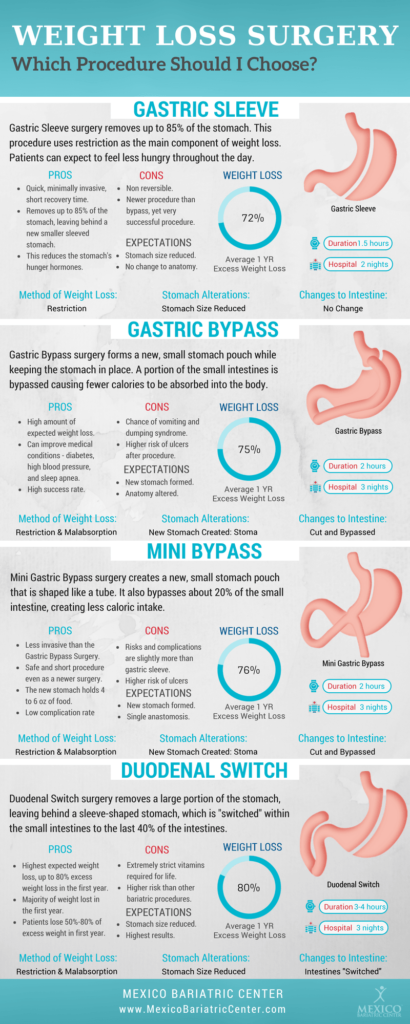 nine0003
nine0003
06. Food addiction
SUMMARY:
- Food addiction is a serious problem that can lead to weight gain
There are a number of reasons why people do not only eat when they are hungry. The most common cause is dependence on the pleasant sensations caused by the taste of food.
There are also various emotional and psychological reasons why people eat more than what is required by the feeling of satisfying hunger.
We should not forget about the biological reasons that contribute to the excessive consumption of food.
In some cases, overeating can lead to addiction-like behavior. If you are concerned about these eating disorders, visit the Psychological Aspects of Obesity page, where you can find a lot of interesting information for yourself.
If after reading the materials you still have / have any questions, you can always ask them to our specialist and get a qualified answer. nine0003
nine0003
07. 12 tips to help you maintain your weight
1. Use a food diary to plan and record the foods you eat.
-
- Plan your meals in advance
- Only shop for items you plan to buy
2. Set goals and record your progress (more on this below)
3. Join the bariatric patient community.
Evidence: Patients who join the community participate in discussions on various issues, share experiences with each other, reduce more overweight and have greater adherence to dietary and nutritional recommendations. nine0075 To join the community of bariatric patients, follow the link - vk.com/bariatricx
4. Set realistic weight loss goals.
Talk to your doctor about realistic weight loss goals. See Types of Bariatric Surgery for the average weight loss after each surgery.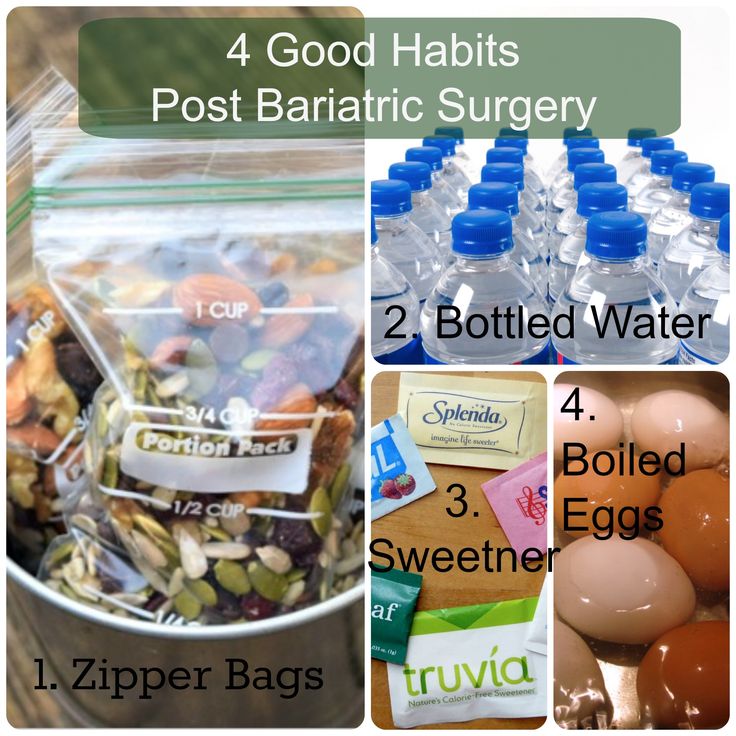
5. Set goals for yourself each month, record your progress, and don't forget to reward yourself when you reach your goal. nine0034
- Rewards may include a massage or spa session, a small party, a barbecue, or a field trip.
Important: be disciplined. Reward yourself only if you achieve your goals. - Related purposes include …
- Weight loss
- Examination after appropriate weight loss
- Nutrition logging
- Physical activity
6. Don't snack!
- Set a meal plan in your diary and stick to it.
NEVER pass or snack between meals.
Important: One scheduled snack is allowed (as agreed with your dietitian)
Regarding grocery shopping …
- Only buy scheduled “healthy” foods (do not buy sweets or “unhealthy” foods - more see above!)
- Do not shop on an empty stomach
Important: high-quality "healthy" products tend to be more expensive, so you will need more money to buy products after surgery.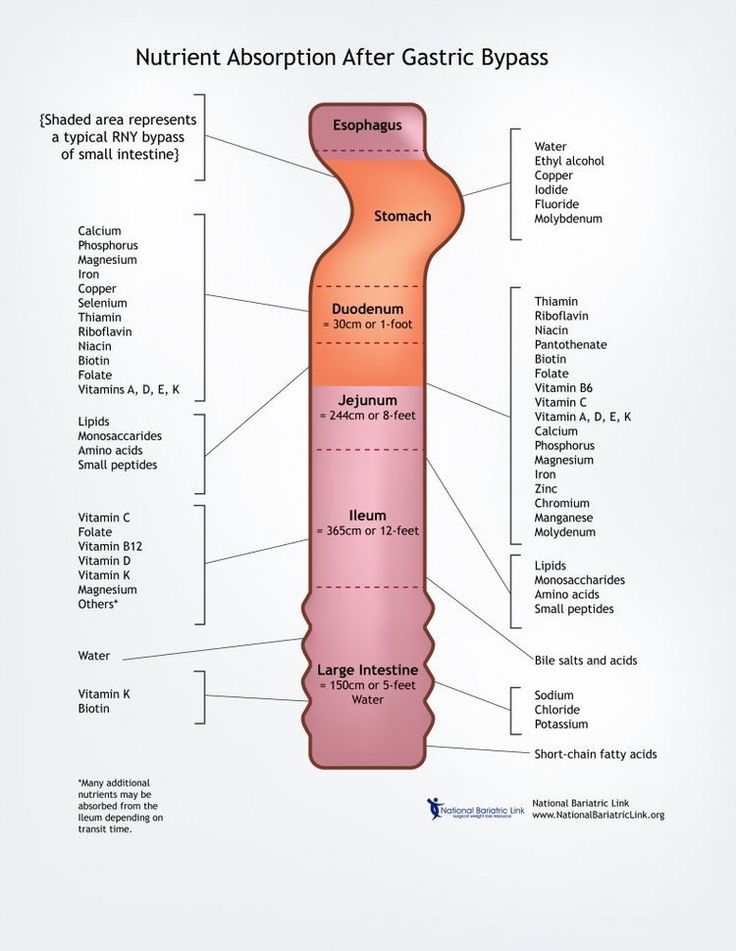
7. Estimate the calorie content of your food.
- Overweight people underestimate the calorie content per meal by as much as 22%.
- Treat your diet in a scientific way: your body will thank you. nine0014
8. Use small dishes.
- At first, the new portion sizes will seem tiny compared to the ones you used before your surgery.
- The small size of the dishes will help you feel full while eating less food.
9. Cut food into small pieces and chew them thoroughly.
- Thus, a small amount of food will cause satiety. nine0014
- “I ate and ate without enjoying food. It became a habit for me to eat as much as I could. After bariatric surgery, for the first time in my life, I feel like I really enjoy food. I eat slowly and enjoy the taste of every bite of food.”
10.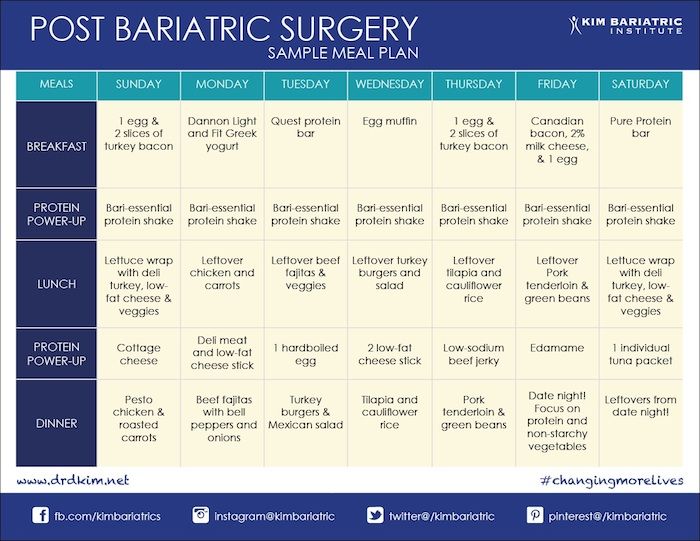 Learn to distinguish between physiological and emotional hunger and try to suppress it (emotional hunger).
Learn to distinguish between physiological and emotional hunger and try to suppress it (emotional hunger).
- The vast majority of patients after bariatric surgery do not experience emotional hunger, but there is still a risk of its development. nine0075 Tip: The best way to prevent overeating due to emotional hunger is to keep a food diary. If you find yourself fooling yourself, pay attention to how you felt and what you started eating.
What happened before you started eating? Has there been stress? Depression?
Don't be afraid to ask a specialist for help!
A nutritionist and psychologist can help you deal with this problem - Some patients in this situation try not to enter the kitchen or stay in the room farthest from the kitchen. nine0075 Try this technique when you are feeling "emotionally" hungry.
11. Try not to eat in front of the TV.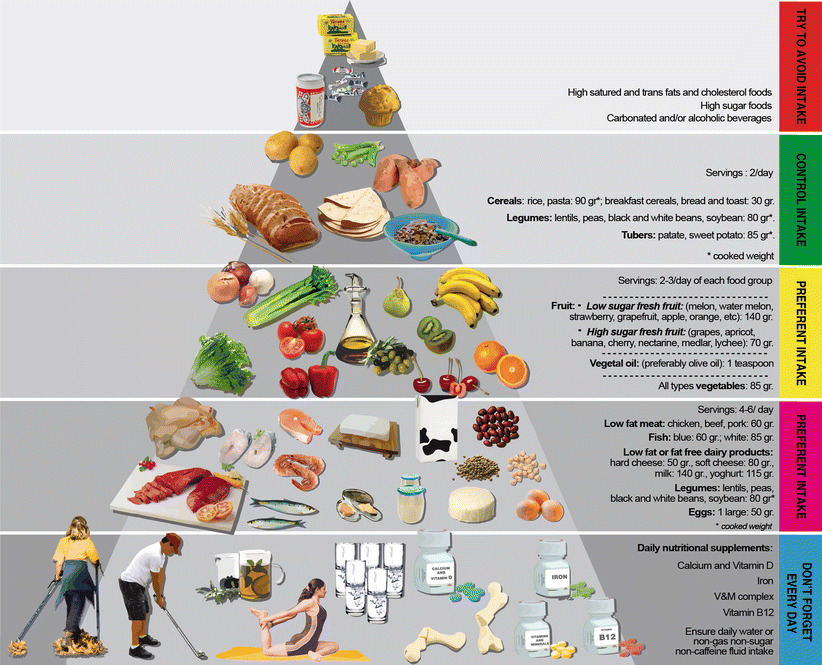
- Research has shown that eating in front of the TV increases the likelihood of non-compliance due to the fact that you become less aware of how much and what you eat.
Avoid watching food commercials.
Remember: Television is a big part of our social life, but it should be noted that food commercials greatly affect the intensity of hunger. nine0014
How to deal with addiction to watching TV and eating while watching TV?
- Instead of watching TV, you can go for a walk or go to the gym
- Watching recorded movies - no commercials
- Read more books and play games - video games, card games and board games.
Why risk it?
In addition to reducing your chances of achieving a good result in terms of weight loss, you deprive yourself of the opportunity to be with loved ones together and organize any joint activities.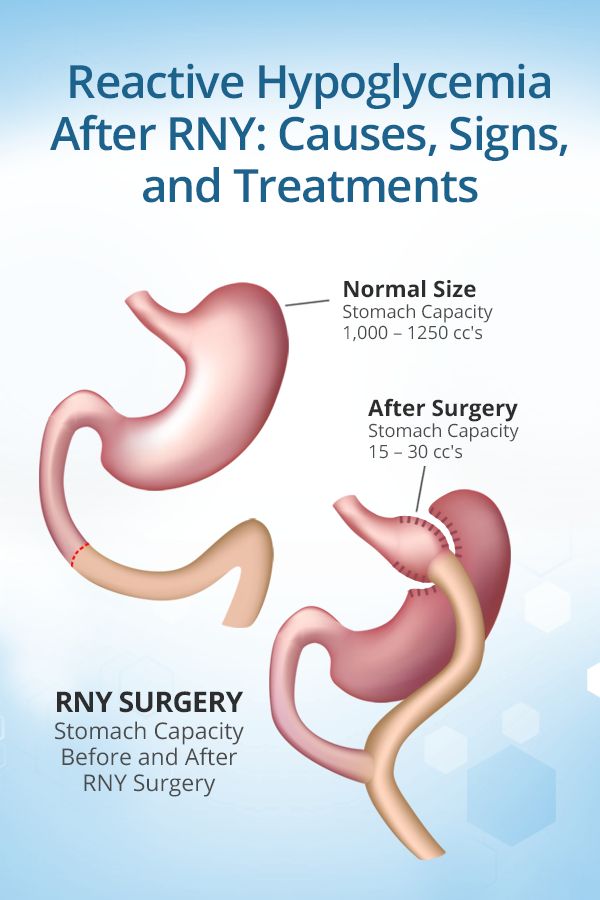 nine0003
nine0003
12. Daily exercise.
- In addition to increasing your metabolic rate, exercise is a great way to clear your mind of hunger and curb your appetite.
- Exercise has been shown to help prevent depression, lower bad cholesterol and increase good cholesterol, improve libido and control insulin and blood glucose. nine0014
- In addition, studies have proven that exercise prolongs life!
08. Vitamins and supplements
SUMMARY:
- Taking the recommended vitamin and mineral supplements will help avoid dangerous deficiencies
Some patients believe that vitamin/mineral deficiencies can only occur after malabsorptive procedures such as LVL, LMWH, and LBP, but this is not the case.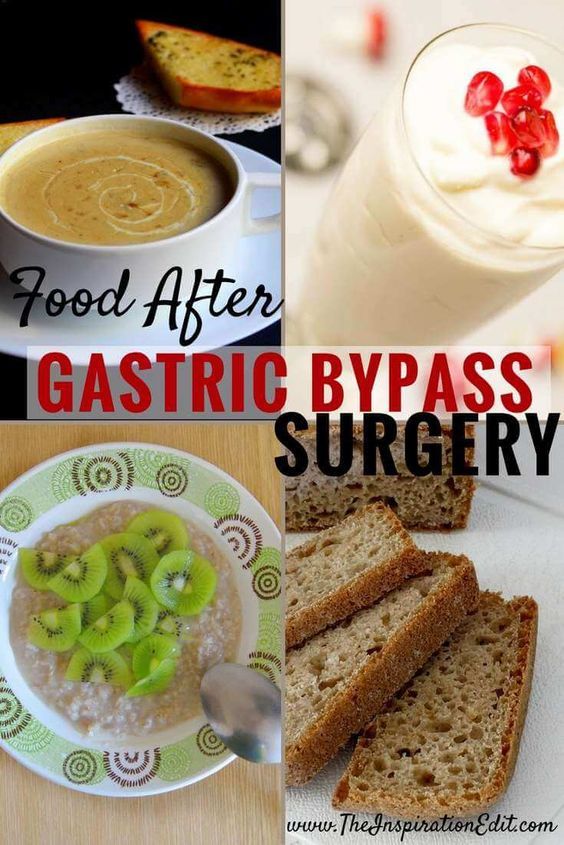
Balloon insertion, LRV, LRV can also cause vitamin and mineral deficiencies.
See Vitamin Therapy After Bariatric Surgery for all relevant information in this section.
09. Foods to avoid
SUMMARY:
- List of “forbidden” foods
- List of possible trigger foods (i.e. foods that may cause digestive problems)
First, let's talk about what foods to avoid.
What are "trigger products"?
- These are foods that disrupt the digestive system (causing digestive problems such as difficulty swallowing, vomiting, diarrhea or constipation).
- When you're transitioning to a new diet, it's important to stop eating certain foods for a while while your gastrointestinal tract begins to work.
You may be able to avoid the side effects of these products by reducing the amount of them, but there is a possibility that you will need to stop using them completely.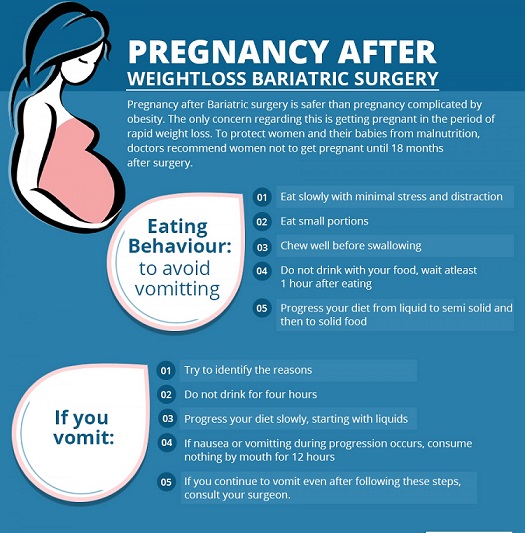 nine0014
nine0014
According to the IFSO, the following foods may cause digestive problems.
-
- Carbonated drinks
- Soft "dry" bread
- Pasta
- Rice
- Hard, dry red meat
- Nuts
- Popcorn
- Foods rich in coarse fiber
- Caffeine in excess
- Alcohol in excess (details in the section "Alcohol")
Please note: the following foods must be permanently eliminated from your diet...
-
- Sugar, sugar products (this also includes honey)
- Fruit juice
- Saturated fats
- Fried foods
Remember: Food intolerance is strictly individual for each patient.
The first step is to make sure you are eating “healthy” food (for more details, see What will I eat after surgery )
Important: The following foods should be reduced:
- Dairy products may cause digestive problems due to lactose intolerance.
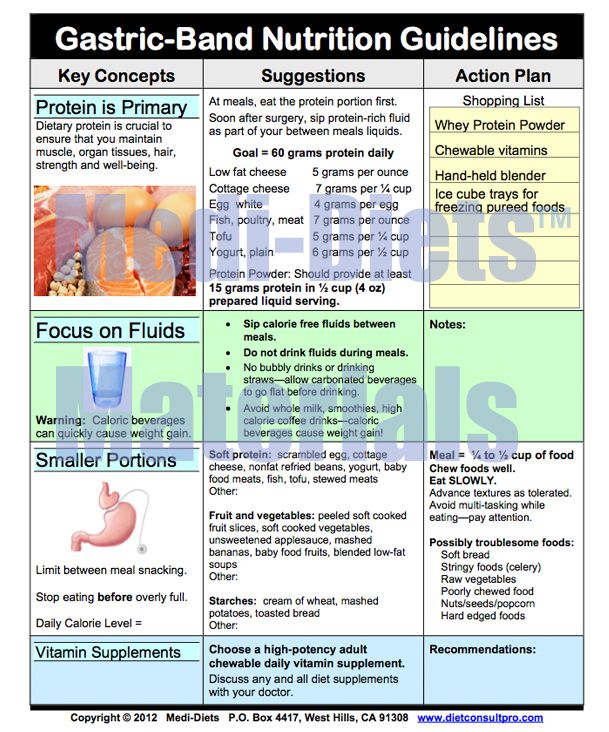
Common symptoms of intolerance are bloating, cramps, and diarrhea. If you have some lactose intolerance, low-fat milk should be preferred (skimmed milk and low-fat dairy products are a must after bariatric surgery anyway!). If intolerance symptoms persist, lactose-free milk and soy products should be tried. nine0014
- Starches and carbohydrates , when consumed in excess, can also interfere with the digestive system.
Eat bread, pasta and rice in moderation. - Some hard-to-digest fruits and vegetables (eg, celery, raw vegetables, dried fruits, and fruits with skins) may cause digestive problems, including vomiting, excess gas, and abdominal cramps.
- Tough meat , if not chewed thoroughly, can “get stuck” and cause vomiting. Eating meat is very important for getting enough protein in the body, but you should cook it in a way that it is tender (steaming, baking).
Main principle: Eat slowly, chew your food thoroughly!
10.
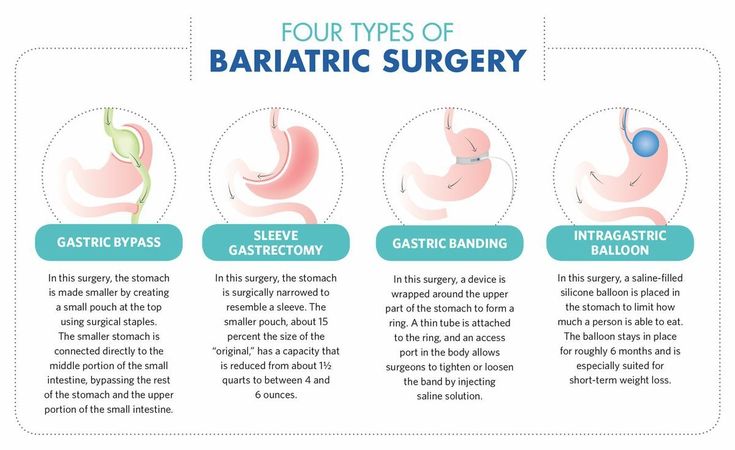 Alcohol after bariatric surgery
Alcohol after bariatric surgery SUMMARY:
- You should avoid drinking alcohol after surgery as much as possible
- If you cannot completely give up alcohol, significantly reduce the amount of alcohol
- Many types of bariatric surgeries change the anatomy and function of your digestive system. As a result of the intervention, alcohol will have a much stronger effect on your digestive system, since:
- Significantly reduced part of the stomach that metabolizes alcohol
- The greatest amount of alcohol absorption occurs in the small intestine.
- Instead of being partially absorbed by the stomach, after bariatric surgery, most of the alcohol quickly passes into the small intestine.
Remember: If there was food in the stomach at the time of drinking, the feeling of intoxication will be less and it will take longer to reach.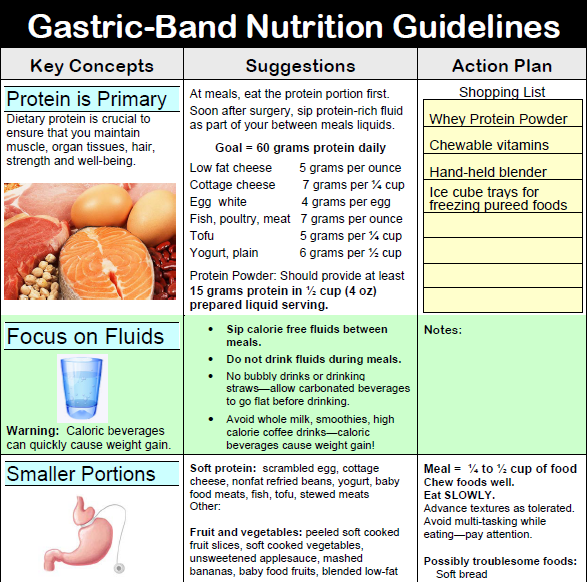
In the event that you drink alcohol on an empty stomach, alcohol does not mix with any food and quickly enters the small intestine, where it is absorbed and causes a feeling of intoxication. nine0003
Interesting: It should be noted that if you follow the rule “no liquids during meals and less than an hour after meals”, you will always drink alcohol on an empty stomach.
Important: Sugar and other simple carbohydrates, found in abundance in alcoholic beverages, can ruin your daily weight loss goals and promote weight gain.
Please note that some alcohol-related conditions increase the risk of complications after surgery, including…
-
- Gastroesophageal reflux disease
- Gastritis
- Heart problems
- Hypoglycemia
- Neurocirculatory dystonia
- Liver injury
- Neuromuscular and cognitive dysfunction
- Pancreatitis
Remember: Drinking alcohol makes it much harder to follow dietary recommendations.